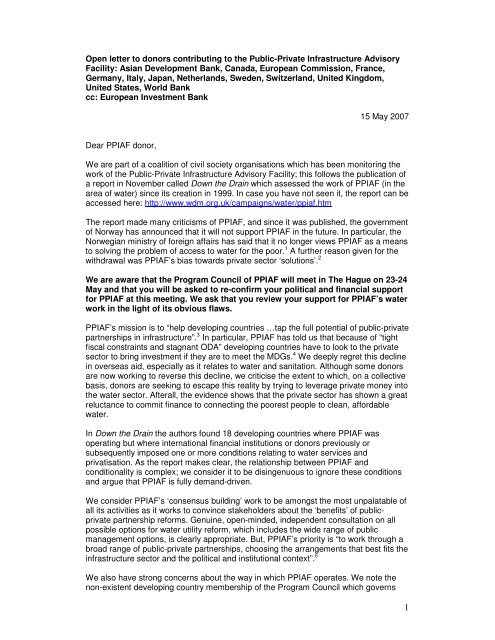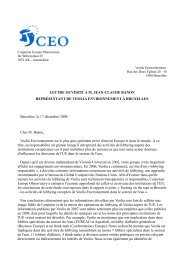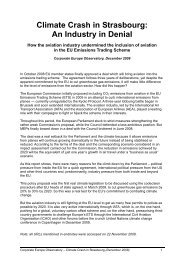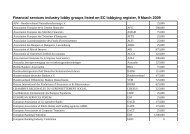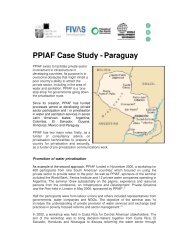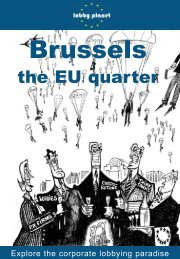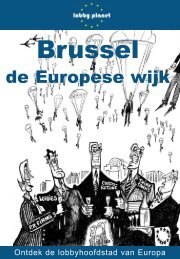Open letter to the donors contributing to the PPIAF (May 2007)
Open letter to the donors contributing to the PPIAF (May 2007)
Open letter to the donors contributing to the PPIAF (May 2007)
- No tags were found...
Create successful ePaper yourself
Turn your PDF publications into a flip-book with our unique Google optimized e-Paper software.
<strong>Open</strong> <strong>letter</strong> <strong>to</strong> <strong>donors</strong> <strong>contributing</strong> <strong>to</strong> <strong>the</strong> Public-Private Infrastructure Advisory<br />
Facility: Asian Development Bank, Canada, European Commission, France,<br />
Germany, Italy, Japan, Ne<strong>the</strong>rlands, Sweden, Switzerland, United Kingdom,<br />
United States, World Bank<br />
cc: European Investment Bank<br />
15 <strong>May</strong> <strong>2007</strong><br />
Dear <strong>PPIAF</strong> donor,<br />
We are part of a coalition of civil society organisations which has been moni<strong>to</strong>ring <strong>the</strong><br />
work of <strong>the</strong> Public-Private Infrastructure Advisory Facility; this follows <strong>the</strong> publication of<br />
a report in November called Down <strong>the</strong> Drain which assessed <strong>the</strong> work of <strong>PPIAF</strong> (in <strong>the</strong><br />
area of water) since its creation in 1999. In case you have not seen it, <strong>the</strong> report can be<br />
accessed here: http://www.wdm.org.uk/campaigns/water/ppiaf.htm<br />
The report made many criticisms of <strong>PPIAF</strong>, and since it was published, <strong>the</strong> government<br />
of Norway has announced that it will not support <strong>PPIAF</strong> in <strong>the</strong> future. In particular, <strong>the</strong><br />
Norwegian ministry of foreign affairs has said that it no longer views <strong>PPIAF</strong> as a means<br />
<strong>to</strong> solving <strong>the</strong> problem of access <strong>to</strong> water for <strong>the</strong> poor. 1 A fur<strong>the</strong>r reason given for <strong>the</strong><br />
withdrawal was <strong>PPIAF</strong>’s bias <strong>to</strong>wards private sec<strong>to</strong>r ‘solutions’. 2<br />
We are aware that <strong>the</strong> Program Council of <strong>PPIAF</strong> will meet in The Hague on 23-24<br />
<strong>May</strong> and that you will be asked <strong>to</strong> re-confirm your political and financial support<br />
for <strong>PPIAF</strong> at this meeting. We ask that you review your support for <strong>PPIAF</strong>’s water<br />
work in <strong>the</strong> light of its obvious flaws.<br />
<strong>PPIAF</strong>’s mission is <strong>to</strong> “help developing countries …tap <strong>the</strong> full potential of public-private<br />
partnerships in infrastructure”. 3 In particular, <strong>PPIAF</strong> has <strong>to</strong>ld us that because of “tight<br />
fiscal constraints and stagnant ODA” developing countries have <strong>to</strong> look <strong>to</strong> <strong>the</strong> private<br />
sec<strong>to</strong>r <strong>to</strong> bring investment if <strong>the</strong>y are <strong>to</strong> meet <strong>the</strong> MDGs. 4 We deeply regret this decline<br />
in overseas aid, especially as it relates <strong>to</strong> water and sanitation. Although some <strong>donors</strong><br />
are now working <strong>to</strong> reverse this decline, we criticise <strong>the</strong> extent <strong>to</strong> which, on a collective<br />
basis, <strong>donors</strong> are seeking <strong>to</strong> escape this reality by trying <strong>to</strong> leverage private money in<strong>to</strong><br />
<strong>the</strong> water sec<strong>to</strong>r. Afterall, <strong>the</strong> evidence shows that <strong>the</strong> private sec<strong>to</strong>r has shown a great<br />
reluctance <strong>to</strong> commit finance <strong>to</strong> connecting <strong>the</strong> poorest people <strong>to</strong> clean, affordable<br />
water.<br />
In Down <strong>the</strong> Drain <strong>the</strong> authors found 18 developing countries where <strong>PPIAF</strong> was<br />
operating but where international financial institutions or <strong>donors</strong> previously or<br />
subsequently imposed one or more conditions relating <strong>to</strong> water services and<br />
privatisation. As <strong>the</strong> report makes clear, <strong>the</strong> relationship between <strong>PPIAF</strong> and<br />
conditionality is complex; we consider it <strong>to</strong> be disingenuous <strong>to</strong> ignore <strong>the</strong>se conditions<br />
and argue that <strong>PPIAF</strong> is fully demand-driven.<br />
We consider <strong>PPIAF</strong>’s ‘consensus building’ work <strong>to</strong> be amongst <strong>the</strong> most unpalatable of<br />
all its activities as it works <strong>to</strong> convince stakeholders about <strong>the</strong> ‘benefits’ of publicprivate<br />
partnership reforms. Genuine, open-minded, independent consultation on all<br />
possible options for water utility reform, which includes <strong>the</strong> wide range of public<br />
management options, is clearly appropriate. But, <strong>PPIAF</strong>’s priority is “<strong>to</strong> work through a<br />
broad range of public-private partnerships, choosing <strong>the</strong> arrangements that best fits <strong>the</strong><br />
infrastructure sec<strong>to</strong>r and <strong>the</strong> political and institutional context”. 5<br />
We also have strong concerns about <strong>the</strong> way in which <strong>PPIAF</strong> operates. We note <strong>the</strong><br />
non-existent developing country membership of <strong>the</strong> Program Council which governs<br />
1
<strong>PPIAF</strong>; as <strong>PPIAF</strong> says it is “owned and directed by its participating <strong>donors</strong>”. 6 The Down<br />
<strong>the</strong> Drain report also criticises <strong>PPIAF</strong> for a lack of transparency regarding its activities.<br />
In <strong>the</strong> light of <strong>the</strong>se criticisms, <strong>the</strong>re are very serious questions <strong>to</strong> be asked<br />
about whe<strong>the</strong>r donor funding for <strong>PPIAF</strong>’s water projects can be considered <strong>to</strong> be<br />
<strong>the</strong> most effective and appropriate expenditure of this aid. Our conclusion is that<br />
this aid could be better spent and we ask <strong>donors</strong> <strong>to</strong> withdraw this funding<br />
accordingly.<br />
We are aware that at <strong>the</strong> <strong>May</strong> Program Council meeting <strong>the</strong>re will be discussion about<br />
“a new window within <strong>PPIAF</strong> <strong>to</strong> support sub-national entities and select public<br />
enterprises as <strong>the</strong>y access market-based private financing <strong>to</strong> invest in improved<br />
service delivery”. 7 <strong>PPIAF</strong> has said that we should be “happy” about this as this<br />
addresses ano<strong>the</strong>r important criticism of <strong>PPIAF</strong> in Down <strong>the</strong> Drain, namely <strong>the</strong> lack of<br />
<strong>PPIAF</strong> support for public-led reforms such as those possible through public-public<br />
partnerships.<br />
No information on <strong>the</strong>se proposals is available on <strong>PPIAF</strong>’s website; however, from <strong>the</strong><br />
little that we do know, we feel strongly that this proposal is very far removed from <strong>the</strong><br />
agenda that was put forward for <strong>donors</strong> in Down <strong>the</strong> Drain in <strong>the</strong> area of public sec<strong>to</strong>r<br />
reform and public-public partnerships. That report said:<br />
“It is clear that a new facility is required <strong>to</strong> promote public-public partnerships; one<br />
which places commitment <strong>to</strong> <strong>the</strong> public sec<strong>to</strong>r at <strong>the</strong> heart of its ethos. It would not be<br />
desirable <strong>to</strong> add public-public partnerships in<strong>to</strong> <strong>the</strong> remit of <strong>PPIAF</strong>, an organisation<br />
which is set up <strong>to</strong> promote private sec<strong>to</strong>r participation. A wholly new organisation is<br />
required <strong>to</strong> address <strong>the</strong> criticisms of <strong>the</strong> way in which <strong>PPIAF</strong> operates and which<br />
employs staff with experience of, and commitment <strong>to</strong>, public provision of water and<br />
sanitation services.”<br />
We urge <strong>donors</strong> <strong>to</strong> oppose <strong>the</strong> extension of <strong>PPIAF</strong>’s remit and instead <strong>to</strong><br />
collaborate <strong>to</strong>ge<strong>the</strong>r <strong>to</strong> create a wholly new mechanism <strong>to</strong> support public-public<br />
partnerships in <strong>the</strong> water sec<strong>to</strong>r. In recent months, several <strong>PPIAF</strong> <strong>donors</strong> (UK,<br />
Japan, Asian Development Bank, as well as Norway) have indicated support for <strong>the</strong><br />
UN’s proposal for water opera<strong>to</strong>r partnerships; we believe that this agenda should be<br />
followed vigorously with strong political and financial support as part of an alternative<br />
strategy <strong>to</strong> funding <strong>PPIAF</strong>.<br />
A number of us have approached <strong>PPIAF</strong> for permission <strong>to</strong> observe <strong>the</strong> Program<br />
Council meeting in The Hague; regrettably our request was rejected.<br />
We look forward <strong>to</strong> your response <strong>to</strong> this <strong>letter</strong> and an indication of how you will<br />
scrutinise and review your support for <strong>PPIAF</strong>.<br />
Yours faithfully,<br />
1. 11.11.11- Coalition of <strong>the</strong> Flemish North South movement - Belgium<br />
2. ABVAKABO FNV – Ne<strong>the</strong>rlands<br />
3. Acción Ecológica - Ecuador<br />
4. Afectados por el Sistema de Represas de la Región Lagunera - México<br />
5. African Water Network<br />
6. Afrika–Europa Netwerk - Ne<strong>the</strong>rlands<br />
7. Alliance of Government Workers in <strong>the</strong> Water Sec<strong>to</strong>r – <strong>the</strong> Philippines<br />
8. Alliance Sud - Switzerland<br />
9. A SEED Europe<br />
10. Asienhaus - Germany<br />
2
11. Association Camerounaise des juristes de l'environnement - Cameroon<br />
12. Attac – Finland<br />
13. Attac Flanders - Belgium<br />
14. BanglaPraxis - Bangladesh<br />
15. Bread for <strong>the</strong> World – Germany<br />
16. Bret<strong>to</strong>n Woods Project - UK<br />
17. Bund für Umwelt und Naturschutz Deutschland e.V. - Germany<br />
18. Campagna per la Riforma della Banca Mondiale - Italy<br />
19. Campaña el Agua un bien Público y un Derecho Fundamental - Colombia<br />
20. Canadian Union of Public Employees - Canada<br />
21. CEE Bankwatch Network Europe<br />
22. Centre for Civil Society Economic Justice Project - South Africa<br />
23. Centre for Human Rights, Justice and Peace – India<br />
24. Centro de Ecologia y Desarrollo - México<br />
25. Centro de Pesquisa e Assessoria - Brazil<br />
26. Coalicion de Organizaciones Mexicanas por el Derecho al Agua - México<br />
27. Collaborative for Advancement of Studies in Urbanism through Mixed Media -<br />
India<br />
28. Collective Initiative for Research and Action - Nepal<br />
29. Comisión Nacional en Defensa del Agua y la Vida - Uruguay<br />
30. CONREHABIT- México<br />
31. Coordinadora de Defensa del Agua - Bolivia<br />
32. Corner House - UK<br />
33. Corporate Accountability International - USA<br />
34. Corporate Europe Observa<strong>to</strong>ry – Ne<strong>the</strong>rlands<br />
35. Council of Canadians + Blue Planet Project - Canada<br />
36. Ecologistas en Acción - Spain<br />
37. ECOVIDA - Peru<br />
38. Educación para la Paz – México<br />
39. Enginyeria Sense Fronteres - Spain<br />
40. Environment and Social Development Organization - Bangladesh<br />
41. European Federation of Public Service Unions<br />
42. Federación de Funcionarios de OSE – Uruguay<br />
43. Federación de Trabajadores Fabriles de Cochabamba - Bolivia<br />
44. Fivas – Norway<br />
45. Focus on <strong>the</strong> Global South<br />
46. Food & Water Watch – USA<br />
47. Forest Peoples Programme - UK<br />
48. Forschungs und Dokumentationszentrum Chile-Lateinamerika - Germany<br />
49. Foundation for Gaia - UK<br />
50. France Libertés Fondation Danielle Mitterrand - France<br />
51. Frente Cearense por uma Nova Cultura de Água - Brazil<br />
52. Frente Nacional de Saneamen<strong>to</strong> Ambiental - Brazil<br />
53. Friends of <strong>the</strong> Earth - Australia<br />
54. Friends of <strong>the</strong> Earth - Bolivia<br />
55. Friends of <strong>the</strong> Earth / Center for Environment and Development - Cameroon<br />
56. Friends of <strong>the</strong> Earth - Canada<br />
57. Friends of <strong>the</strong> Earth / CENSAT – Colombia<br />
58. Friends of <strong>the</strong> Earth / COECOCeiba - Costa Rica<br />
59. Friends of <strong>the</strong> Earth / Limassol - Cyprus<br />
60. Friends of <strong>the</strong> Earth - Europe<br />
61. Friends of <strong>the</strong> Earth - Finland<br />
62. Friends of <strong>the</strong> Earth - France<br />
63. Friends of <strong>the</strong> Earth - Guatemala<br />
64. Friends of <strong>the</strong> Earth / WALHI - Indonesia<br />
65. Friends of <strong>the</strong> Earth / Federation for Environmental Movements - Korea<br />
3
66. Friends of <strong>the</strong> Earth - New Zealand<br />
67. Friends of <strong>the</strong> Earth / Environmental Rights Action - Nigeria<br />
68. Friends of <strong>the</strong> Earth / CELCOR – Papua New Guinea<br />
69. Friends of <strong>the</strong> Earth / Sobrevivencia - Paraguay<br />
70. Friends of <strong>the</strong> Earth / Legal Rights and Natural Resources Center – <strong>the</strong><br />
Philippines<br />
71. Friends of <strong>the</strong> Earth / CEPA - Slovakia<br />
72. Friends of <strong>the</strong> Earth / Groundwork - South Africa<br />
73. Friends of <strong>the</strong> Earth / Pro Natura - Switzerland<br />
74. Friends of <strong>the</strong> Earth / Sobrevivencia – Uruguay<br />
75. Friends of <strong>the</strong> Earth International<br />
76. Fundación Abril Escuela del Pueblo Primero de <strong>May</strong>o – Bolivia<br />
77. Fundación M´Biguá, Ciudadanía y Justicia Ambiental - Argentina<br />
78. Gamana - India<br />
79. Globalisation Moni<strong>to</strong>r – China<br />
80. Globalization Challenge Initiative - USA<br />
81. Green Alternative - Georgia<br />
82. Green Policy Institute – Bulgaria<br />
83. Habitat International Coalition<br />
84. Indian Social Action Forum – India<br />
85. Indonesian Indigenous People Alliance - Indonesia<br />
86. INFID - Belgium<br />
87. Institute for Community Organisation Research – India<br />
88. Institu<strong>to</strong> Mexicano para el Desarrollo Comunitario - México<br />
89. Irrigation Training and Economic Empowerment Organization – Tanzania<br />
90. Japan Center for a Sustainable Environment and Society - Japan<br />
91. Labour, Health and Human Rights Development Centre - Nigeria<br />
92. Latin America Solidarity Centre - Ireland<br />
93. Malawi Economic Justice network – Malawi<br />
94. Mani Tese - Italy<br />
95. Manthan Adhyayan Kendra - India<br />
96. Millennium Solidarity - Switzerland<br />
97. MISEREOR e.V.- Germany<br />
98. Mumbai Paani – India<br />
99. National Civil Society Network for Water and Sanitation - Nigeria<br />
100. National Coalition Against Privatisation - Ghana<br />
101. NGO Forum on Asian Development Bank<br />
102. Norwegian Campaign for Debt Cancellation - Norway<br />
103. Oakland Institute - USA<br />
104. Otros Mundos - México<br />
105. Our Water - Germany<br />
106. Oxfam - Canada<br />
107. People's Coalition for <strong>the</strong> Right <strong>to</strong> Water - Indonesia<br />
108. People's Union for Civil Liberties (Tamil Nadu and Puducherry) - India<br />
109. Planeta Agua - Colombia<br />
110. Public Services International<br />
111. Rede Brasil sobre Instituições Financeiras Multilaterais - Brazil<br />
112. Rede Brasileira pela Integração dos Povos - Brazil<br />
113. Right <strong>to</strong> Food Movement - Bangladesh<br />
114. Sindica<strong>to</strong> de la Empresa de Agua Potable y Saneamien<strong>to</strong> - Uruguay<br />
115. Solidarity Workshop - Bangladesh<br />
116. South Durban Community Environmental Alliance - South Africa<br />
117. Spire, Utviklingsfondet - Norway<br />
118. Sri Lanka Environmental Journalists Forum – Sri Lanka<br />
119. Su Politik Grubu – Turkey<br />
120. Sustainable Obtainable Solutions - USA<br />
4
121. Transnational Institute<br />
122. Umeedenao Citizen Community Board - Pakistan<br />
123. UNISON - UK<br />
124. Urban Research Centre Bangalore – India<br />
125. Urgewald e.V. - Germany<br />
126. Vikas Adhyayan Kendra – India<br />
127. War on Want - UK<br />
128. Water for <strong>the</strong> People Network Asia<br />
129. Water Movement - Norway<br />
130. World Development Movement - UK<br />
131. World Economy, Ecology & Development - Germany<br />
132. World Information Service on Energy - Ne<strong>the</strong>rlands<br />
133. XminusY Solidarity Fund - Ne<strong>the</strong>rlands<br />
1 FIVAS. <strong>2007</strong>. Norway withdraws support from controversial World Bank fund. 22 February<br />
<strong>2007</strong>.<br />
2 Bistands Akuelt. <strong>2007</strong>. Issue nr. 2. The MFA lessened <strong>to</strong> <strong>the</strong> organisation FIVAS instead of<br />
<strong>the</strong>ir own staff advice.<br />
3 <strong>PPIAF</strong>, <strong>2007</strong>. 2006 Annual Report. January <strong>2007</strong>.<br />
4 Letter <strong>to</strong> <strong>the</strong> World Development Movement from Jyoti Shukla, Program Manager, <strong>PPIAF</strong>. 20<br />
March <strong>2007</strong>.<br />
5 <strong>PPIAF</strong>, <strong>2007</strong>. 2006 Annual Report. January <strong>2007</strong>.<br />
6 <strong>PPIAF</strong>, <strong>2007</strong>. 2006 Annual Report. January <strong>2007</strong>.<br />
7 Letter <strong>to</strong> <strong>the</strong> World Development Movement from Jyoti Shukla, Program Manager, <strong>PPIAF</strong>. 20<br />
March <strong>2007</strong>.<br />
5


